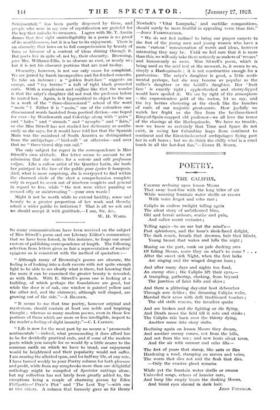POETRY.
THE CALIPHS.
CALIPHS reclining upon lemon Moons That sway boat-like with the long tides of air While wanning fountain water shrills or croons With voice forgot and echo rare ; Caliphs in endless twilight telling again The silent story of unfathomed bliss, Old and heroic ardours, scathe and pain, And softer secret ecstasies ; Telling again—to no ear but the mind's—.
Past splendours, and the hour's sleek-faced delight, The dark couch, breath that drowses, hair that blinds, Young breast that wakes and lulls the night ; Musing on the past, sunk on pale dusking arcs Of falling Moons, muse they on what's to come ? . . After the sweet sick Night, when the first larks Are singing and the winged dragons hum ; And after many days and nights too fond, An enemy stirs ; the Caliphs lift their eyes,— A trampling, gathering, clashing, from beyond The junction of faint hills and skies ; And there a glittering day-star host debauches Through sore defiles ; the dreaming Caliphs wake, Marshal their arms with deft traditioned touches ; The old strife renews, the invaders quake And are broken and die fighting or die flying, And Death noses the field till it rots and stinks ; The Caliphs ride back over the thirsty dying, Another name into story sinks.
Reclining again on lemon Moons they dream, And another enemy comes, not from the hills, And not from the sea ; and new hosts silent teem, And the air with rumour and echo fills— The feet of years that stamp, like ants or flies
Hardening a road, stamping on nerves and veins, The worm that dies not and the flesh that dies. —Only the evasive ghost remains While yet the fountain water shrills or croons Unheeded songs, echoes of heavier care, And hang like empty boats the dusking Moons, And timid eyes shroud in dark hair.
JOHN FREEMAN.










































 Previous page
Previous page